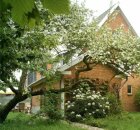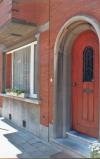|
About Belgium (courtesy of Wikipedia)
The Kingdom of Belgium (Dutch: Koninkrijk België; French: Royaume de Belgique; German: Königreich Belgien) is a country in northwest Europe bordered by the Netherlands, Germany, Luxembourg and France and is one of the founding and core members of the European Union. Belgium has a population of over ten million people, in an area of around 30,000 square kilometres (11,700 square miles).
Straddling the cultural boundary between Germanic and Romance Europe, Belgium is linguistically divided. It has two main languages: 59% of its population, being 6.18 million people in the north, mainly in the region Flanders, speak Dutch (while Belgians of both major languages often refer to it as Flemish); French is spoken by 40%: 3.29 million in the southern region Wallonia and an estimated 0.88 million in the officially bilingual Brussels-Capital Region or 85-90% of its residents – thus a minority there speaks Dutch, its local language till the first half of the 20th century. Less than 1% of the Belgians, around 70,000 live in the German-speaking Community in the east of the Walloon Region. This linguistic diversity often leads to political and cultural conflict and is reflected in Belgium's complex system of government and political history.
Belgium derives its name from the Latin name of the northernmost part of Gaul, Gallia Belgica, named after a group of mostly Celtic tribes, Belgae. Historically, Belgium has been a part of the Low Countries, which also include the Netherlands and Luxembourg and used to cover a somewhat larger region than the current Benelux group of states. From the end of the Middle Ages until the seventeenth century, it was a prosperous centre of commerce and culture. From the sixteenth century until the Belgian revolution in 1830, the area at that time called the Southern Netherlands, was the site of many battles between the European powers, and has been dubbed "the battlefield of Europe"[2] or "the cockpit of Europe".[3] More recently, Belgium was a founding member of the European Union, hosting its headquarters, as well as those of many other major international organizations, such as NATO.
Belgian cultural life has tended to concentrate within each community. The shared element is less important, because there are no bilingual universities, except the royal military academy, no common media, and no single, common large cultural or scientific organisation where both main communities are represented.
Belgium is well-known for its fine art and architecture. The region corresponding to today's Belgium has seen the flourishing of major artistic movements that have had tremendous influence over European art. The Mosan art, the Early Netherlandish, the Flemish Renaissance and Baroque painting, and major examples of Romanesque, Gothic, Renaissance and Baroque architecture, and the Renaissance vocal music of the Franco-Flemish School developed in the southern part of the Low Countries, are milestones in the history of art. Famous names in this classic tradition are Jan van Eyck, Pieter Brueghel the Elder, Peter Paul Rubens and Anthony van Dyck. This rich artistic production, often referred to as a whole as Flemish art, gradually declined during the second half of the seventeenth century. However, in the nineteenth and twentieth centuries, many original artists appeared. Belgium has produced famous romantic, expressionist and surrealist painters; these include Egide Wappers, James Ensor, Constant Permeke and René Magritte. Belgium has a thriving contemporary art scene, with internationally renowned artists such as Jan Fabre and the painter Luc Tuymans.
In music, Adolphe Sax invented the saxophone in 1846. Henri Vieuxtemps, Eugène Ysaÿe and Arthur Grumiaux were major nineteenth- and twentieth-century violinists. Perhaps the most famous Belgian composer of this time was César Franck. The first Belgian singer to successfully pursue an international career is the pioneer of varieté and pop music Bobbejaan Schoepen. Jazz musician Toots Thielemans is world famous, so is singer Jacques Brel. In rock/pop music, K's Choice, Hooverphonic, Front 242 and dEUS are well known (see also Music of Belgium).
In architecture, Victor Horta was a major initiator of the Art Nouveau style.
In literature, Belgium has produced several well-known authors, such as the poets Emile Verhaeren and novelists Hendrik Conscience, Georges Simenon and Suzanne Lilar. The poet and playwright Maurice Maeterlinck won the Nobel Prize in literature in 1911. The best known Franco-Belgian comics are The Adventures of Tintin by Hergé but many other major authors of comics have been Belgian, including Peyo (the smurfs), André Franquin, Edgar P. Jacobs and Willy Vandersteen.
More recently, notable Belgian cinema directors have emerged, most of them strongly influenced by French cinema. The absence of a major Belgian cinema company has forced them to emigrate or participate in low-budget productions. Belgian directors include André Delvaux, Stijn Coninx, Luc and Jean-Pierre Dardenne; actors include Jan Decleir, Marie Gillain; and films include Man Bites Dog (film) and The Alzheimer Affair. In the 1980s, Antwerp's Royal Academy of Fine Arts produced the important fashion trendsetters, the Antwerp Six.
Belgium has also contributed to the development of science and technology. Mathematician Simon Stevin, anatomist Andreas Vesalius and cartographer Gerardus Mercator are among the most influential scientists from the beginning of the Early Modern Age in the Low Countries. More recently, at the end of the nineteenth century, in applied science, the chemist Ernest Solvay and the engineer Zenobe Gramme have given their names to the Solvay process and the Gramme dynamo. Georges Lemaître is a famous Belgian cosmologist credited with proposing the Big Bang theory of the origin of the universe in 1927. Three Nobel Prizes in Physiology or Medicine have been awarded to Belgians: Jules Bordet in 1919, Corneille Heymans in 1938, and Albert Claude and Christian De Duve in 1974. Ilya Prigogine was awarded the Nobel Prize in Chemistry in 1977.
On December 1, 2012, Father Damien was chosen as the Greatest Belgian of all time by the Flemish VRT, whereas the Walloons chose Jacques Brel.
One cannot understand Belgian cultural life without considering the folk festivals, which play a major role in the country's cultural life. Examples are the Carnival of Binche and Aalst, the Ducasse of Ath, the procession of the Holy Blood in Bruges, the August 15 festival in Liège, and the Walloon festival in Namur. A major non-official holiday is the Saint Nicholas Day, which commemorates the festival of the children and, in Liège, of the students.
Football and cycling are especially popular. Among the well known cyclists, Eddy Merckx won five Tours de France and is considered one of the best cyclists ever because of his numerous victories in the Tour as well as other bicycle races. Belgium has two current female tennis champions: Kim Clijsters and Justine Henin. The Spa-Francorchamps motor-racing circuit is considered one of the most challenging in the world and is home to the Belgian Grand Prix (a Formula One World Championship race) and a 24 hour saloon car race. Belgium's most notable racing driver is Jacky Ickx, winner of eight Grands Prix and a (then) record six Le Mans 24hr races. (The current record for most Le Mans wins is seven, set in 2012 by the Dane Tom Kristensen.)
Belgium is well known for its cuisine. Many highly ranked restaurants can be found in the high-impact gastronomic guides, such as the Michelin Guide. Brands of Belgian chocolate, like Neuhaus, and Godiva, are world renowned and widely sold (the less famous but high quality exclusive chocolates include names such as Wittamer and Marcolini). Even the cheapest and most popular brand, Leonidas, has earned a reputation for its quality. Côte d'Or was also initially Belgian. Belgium produces over 500 varieties of beer (see Belgian beer). The biggest brewery in the world by volume is Inbev based in Belgium (company previously known as Interbrew and makers of such beers as Stella Artois and Leffe, merged with the Brazilian brewery Ambev to become the world's biggest). Belgians have a reputation for loving waffles and french fries (both originate from Belgium). The national food is steak (or mussels) with french fries and lettuce.
|




